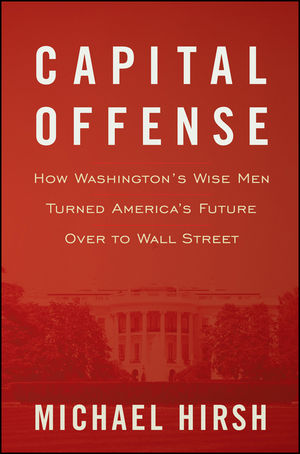 I really like the way Michale Hirsh, author of Capital Offense: How Washington’s Wise Men Turned America’s Future Over to Wall Street, describes the causes of the crisis:
I really like the way Michale Hirsh, author of Capital Offense: How Washington’s Wise Men Turned America’s Future Over to Wall Street, describes the causes of the crisis:
A now infamous 1999 Time magazine cover featured Alan Greenspan (then chairman of the Federal Reserve), Robert E. Rubin (then Treasury Secretary) and Lawrence H. Summers (then deputy Treasury secretary) as “The Committee to Save the World.” The three men, the magazine declared, had steered America through the perilous shoals of highly volatile world markets. The United States economy remained “astonishingly robust” and, by protecting American growth, the three had made “investors deliriously, perhaps delusionally, happy in the process.”
A decade later, in the wake of America’s 2008 fiscal meltdown, the thinking of Time’s “Three Marketeers” and their colleagues in Washington and on Wall Street would be cited as a major cause of that crisis. Mr. Greenspan has been chastised for keeping interest rates too low for too long, for failing to see the danger of subprime mortgages and falling house prices, and for neglecting to use the Fed’s regulatory clout to restrain the excesses in the market. Mr. Rubin has been taken to task for promoting the repeal of the Glass-Steagall Act, which was passed during the Great Depression and prohibited commercial banks from engaging in the investment business. And Mr. Summers has been criticized for failing to foresee the risks derivatives posed and for his reluctance to regulate these exotic financial instruments.
In fact, the main reason the financial crisis of 2008 occurred, the journalist Michael Hirsh argues in his provocative new book, “Capital Offense,” is that “the people in charge of our economy, otherwise intelligent and capable men like Greenspan, Rubin and Summers — and later Hank Paulson and Tim Geithner — permitted themselves to believe, in the face of a rising tide of contrary evidence, that markets are for the most part efficient and work well on their own.”
I came to the same conclusion when tracing the origins of this crisis to the men who radically deregulated the markets in Bailout Nation.
Hirsh puts the prior history of regualtion and deregulation into broader context. Its really about whtehr you believe Human Beings are rational or irrational:
“In these pages Mr. Hirsh looks at how the ideas of John Maynard Keynes — predicated upon the belief that markets do not automatically self-correct, and that government intervention is sometimes necessary — were embraced in Washington in the wake of the Great Depression. He chronicles how the opposing ideas of Milton Friedman — who believed that free markets functioned efficiently without bureaucratic interference — gained ascendancy with the election of Ronald Reagan and the abrupt collapse of the Soviet Union. And he charts how the deregulation movement accelerated during the administrations of Bill Clinton and George W. Bush, arguing that it created an “indomitable zeitgeist” that would set the stage for disaster.
Regarding the differences between advocates of government intervention and those who contend that free markets operate better on their own, Mr. Hirsh says that such arguments, boiled down, are “largely about the issue of human rationality versus irrationality. One side holds that markets are basically rational and efficient on their own — that they are an optimal way for societies to allocate resources — and governments only interfere. The other side holds that markets and the people who make them up often behave irrationally, inefficiently and unjustly, and therefore the best course is to keep government involved at all times.” (emphasis added)
I am going to have to add this one to my credit crisis book queue . . .


What's been said:
Discussions found on the web: